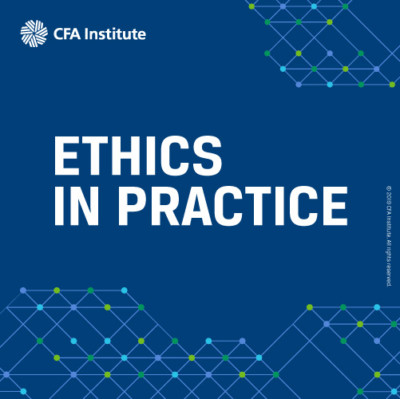Ethics in Practice: Company Transparency During a Global Pandemic. Case and Analysis–Week of 11 May
Analysis Now Posted!
This Ethics in Practice case is part of a series that CFA Institute began publishing in 2017. This particular case relates to ethical issues facing investment professionals in an era of global pandemic. Past cases are available to help you exercise your ethical decision-making skills in the CFA Institute Ethics in Practice Casebook, a compilation of over 100 previously published cases and corresponding analyses.
Case
Because of a global pandemic, which has severely limited the demand for its products, Everett Inc., a major sports equipment manufacturer, has shut down its operation and laid off 90% of its employees. But the government is considering invoking its emergency powers and contracting with the company to make desperately needed medical equipment. A team of Everett’s engineers is working on retooling the machines at the company’s manufacturing plant. In addition, if and when regular product production is resumed, the company will be eligible to receive low cost loans under a government stimulus plan that could greatly affect Everett’s long-term financial position. Jabari, the company’s chief financial officer (CFO), is responsible for investor relations as well as managing the company’s employee pension plan. He is wrestling with how to address all of this information and different potential outcomes in disclosures to investors. Jabari should
- refrain from providing any information because the future is uncertain.
- disclose the potential government contract and that Everett’s engineers are working on transforming the company’s manufacturing capabilities.
- express confidence to investors that, in his opinion, the low-cost government loans will result in minimal disruption to the company’s past profitability projections.
- protect investor interests by aggressively touting Everett’s long-term financial prospects to keep the stock price from collapsing.
- none of the above.
Analysis
One of the fundamental ethical principles for investment professionals is transparency. This principle is embodied in a number of CFA Institute Standards of Professional Conduct, including Standard V(B): Communication with Clients and Prospective Clients and Standard I(C): Misrepresentation. Under these Standards, CFA Institute members must disclose basic information about investments, disclose significant limitations and risks, identify factors that are important to investment analysis, distinguish between fact and opinion, and most importantly, not misrepresent any facts related to investment analysis or their professional activities. At the same time, CFA Standard IV(A): Duties to Employers – Loyalty prohibits CFA Institute members from divulging confidential information about their employer, and Standard II(B): Market Manipulation prohibits members from engaging in practices that distort security prices with the intent to mislead market participants.
In this case, one of Jabari’s responsibilities as CFO of Everett is to provide information about the company to investors and the securities markets so they can make informed investment decisions. Refraining from providing any information about the company (A) will likely not satisfy investors or the financial markets and lead to negative financial consequences for Everett. Although the potential government contract and knowledge that Everett engineers are working on retooling the company’s machines to manufacture medical personal protective equipment is factual (B), Jabari must make sure that this information about the early stages of an enormous new business initiative is not confidential or material nonpublic information. Such information should be disclosed only when it is timely to give to investors generally.
And although the existence and eligibility of Everett for the low-cost government loan program (C) is apparently publicly known, Jabari’s opinion about whether the company takes advantage of this program, the amount of money borrowed, and how the funds will affect Everett’s bottom line seem at this point to be both opinion and speculative. Protecting investor interests and the interests of Everett employees and retirees by maintaining the company’s stock price (D) is a worthy goal. But doing so by circulating false and misleading information in an effort to manipulate the stock price is unethical and a violations of CFA Institute Standard II(B). Although it may be difficult in the uncertain and challenging times, Jabari must work to come up with a balance between helpful, factual information and informed information about the future without disclosing confidential information or overly building up Everett’s financial prospects in a way that could be seen as manipulating the company’s stock price. Under the facts provided, Choice E is the best response.
CFA Institute Members: This case qualifies for 0.25 Professional Learning (PL) hours, including 0.25 hours in the content areas of Standards, Ethics, and Regulations (SER). Be sure to visit the Continuing Education tracker to receive 0.25 PL/0.25 SER credits for completing this case.
Let us know what you think of Ethics in Practice by taking this short survey.
Have an idea for a case for us to feature? Send it to us at [email protected].
More About the Ethics in Practice Series
Just as you need to practice to become proficient at playing a musical instrument, public speaking, or playing a sport, practicing assessing and analyzing situations and making ethical decisions develops your ethical decision-making skills. The Ethics in Practice series gives you an opportunity to “exercise” your ethical decision-making skills. Each week, we post a short vignette, drawn from real-world circumstances, regulatory cases, and CFA Institute Professional Conduct investigations, along with possible responses/actions. We then encourage you to assess the case using the CFA Institute Ethical Decision-Making Framework and through the lens of the CFA Institute Code of Ethics and Standards of Professional Conduct.
Image Credit: ©CFA Institute


What would be effect to shareholders and investors learning from alternative sources of the retooling and fundamental change of business model ahead of an official brief from the company?For instance government briefings on the pandemic where orders are issued publicly about who’s producing what.
B – Disclosure and transparency are important in general and more during a global pandemic